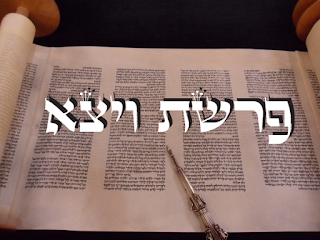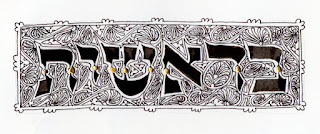Parshat Noach - Genesis 6:9-11:32 - "Abraham's Tent" - Weekly D'var from Rabbi John Ludemann
By Rabbi John Ludemann, BTh.
This week we meet Noah.(Genesis 6:9-11:32)
We also find out why we need prophets. At the end of our last portion of
Genesis, there are a few new aspects, which on the surface look confusing.
The first one is the Creator’s change in relationship with humanity. In Genesis 6:3 that G-D “removed HIS breath from Man’s presence”. In other words, G-D removed his direct presence from Humanity. So, the first of Prophets was born - Noah.
The other strange thing that is mentioned in this passage in verse 3, is the phrase “....let the days allowed him be one hundred and twenty years” (JPS 1999). In Hebrew like in Roman and Greek alphabets, letters also were numbers. The number “120” also is the Hebrew word “Shinnah” meaning “G-D’s Grace”. We know the Creator did not shorten peoples’ lives since folks like Abraham and Aaron lived well beyond that 120 year limit. So, G- D removed his presence directly from Humanity, but allowed HIS Grace to be upon humanity, all the “days” of our lives.
Noah is called “......blameless in his time (age)” (JPS 1999). Why this distinction? Other Prophets like Abraham (next week’s portion), and the like are not given this designation. As we will see, there are a few prophets that are not the “best” people. We see this with Noah, Balaam and in the later part of the Hebrew Bible, with Jonah. The Prophets in the examples above were all wanting to do G-D’s will but had their own agenda. It doesn’t make them bad prophets, it makes them human beings. In Noah’s case he could have warned the rest of humanity and offered a way out (onto the Ark), but Noah chose to keep it to himself. That is what the “Blameless for his age” means.
A side note: It wasn’t two by two the animals went on the Ark. The one paired two by two were non-kosher animals (like cats, dogs, pigs, etc.). The kosher ones were paired in groups of seven (Genesis 7:1-3).
So, as promised, Noah, his wife, his sons and their wives went into the Ark with all the animals and survived the Great Flood.
They found land and the waters receded. Noah becomes concerned that G- D may decide to destroy humanity (Noah’s posterity) again, and G-D does an amazing thing. G-D makes a covenant with all humanity and makes that eternal promise for all time. Not on paper or stone, but in the Heavens. He makes a Rainbow. G-D also, as with all covenants, gives humanity a list of rules to go by to uphold our end of the ‘bargain’.
G-D lists the first commandments for all humanity.
They are known as the Noahide Commandments. They predate the Ten Commandments by some 1,200 years. They are seven commandments (equal to the seven days of creation). They are found in Genesis 9:1-6. They are:
1. No Idolatry
2. No common use of G-D’s Name 3. No Stealing
4. No Murder
5. No sexual assaults (Rape)
6. No cruel treatment of animals 7. Establish Courts of Justice.
This is our goals as humans in the world. They are so prevalent that they are found in the Christian Scriptures as the basis of living (Acts 15:1-31). They are also found in every other religion’s sacred writings in one form or another.
It is a testament to the truth and majesty of the Creator of the Universe. When we see a rainbow we know that even though we are not directly in the presence of G-D, His grace fills our days.
Next week: Abraham.
The Goal At The End Of The Rainbow: Humanity's Covenant
This week we meet Noah.(Genesis 6:9-11:32)
We also find out why we need prophets. At the end of our last portion of
Genesis, there are a few new aspects, which on the surface look confusing.
The first one is the Creator’s change in relationship with humanity. In Genesis 6:3 that G-D “removed HIS breath from Man’s presence”. In other words, G-D removed his direct presence from Humanity. So, the first of Prophets was born - Noah.
The other strange thing that is mentioned in this passage in verse 3, is the phrase “....let the days allowed him be one hundred and twenty years” (JPS 1999). In Hebrew like in Roman and Greek alphabets, letters also were numbers. The number “120” also is the Hebrew word “Shinnah” meaning “G-D’s Grace”. We know the Creator did not shorten peoples’ lives since folks like Abraham and Aaron lived well beyond that 120 year limit. So, G- D removed his presence directly from Humanity, but allowed HIS Grace to be upon humanity, all the “days” of our lives.
Noah is called “......blameless in his time (age)” (JPS 1999). Why this distinction? Other Prophets like Abraham (next week’s portion), and the like are not given this designation. As we will see, there are a few prophets that are not the “best” people. We see this with Noah, Balaam and in the later part of the Hebrew Bible, with Jonah. The Prophets in the examples above were all wanting to do G-D’s will but had their own agenda. It doesn’t make them bad prophets, it makes them human beings. In Noah’s case he could have warned the rest of humanity and offered a way out (onto the Ark), but Noah chose to keep it to himself. That is what the “Blameless for his age” means.
A side note: It wasn’t two by two the animals went on the Ark. The one paired two by two were non-kosher animals (like cats, dogs, pigs, etc.). The kosher ones were paired in groups of seven (Genesis 7:1-3).
So, as promised, Noah, his wife, his sons and their wives went into the Ark with all the animals and survived the Great Flood.
They found land and the waters receded. Noah becomes concerned that G- D may decide to destroy humanity (Noah’s posterity) again, and G-D does an amazing thing. G-D makes a covenant with all humanity and makes that eternal promise for all time. Not on paper or stone, but in the Heavens. He makes a Rainbow. G-D also, as with all covenants, gives humanity a list of rules to go by to uphold our end of the ‘bargain’.
G-D lists the first commandments for all humanity.
They are known as the Noahide Commandments. They predate the Ten Commandments by some 1,200 years. They are seven commandments (equal to the seven days of creation). They are found in Genesis 9:1-6. They are:
1. No Idolatry
2. No common use of G-D’s Name 3. No Stealing
4. No Murder
5. No sexual assaults (Rape)
6. No cruel treatment of animals 7. Establish Courts of Justice.
This is our goals as humans in the world. They are so prevalent that they are found in the Christian Scriptures as the basis of living (Acts 15:1-31). They are also found in every other religion’s sacred writings in one form or another.
It is a testament to the truth and majesty of the Creator of the Universe. When we see a rainbow we know that even though we are not directly in the presence of G-D, His grace fills our days.
Next week: Abraham.



Comments
Post a Comment